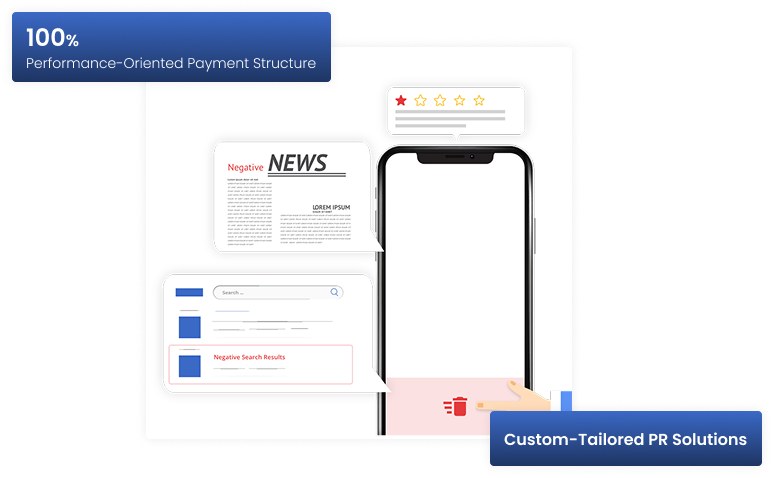
The Best Online Reputation Management Tools
The digital world demands not only your online presence but a reputation that benefits you. Therefore, you need to actively manage your digital footprint, control the narrative, and ensure that your online presence aligns with the image you want to project. Whether you’re a business, a professional, or even a content creator, how people perceive you online directly impacts trust, credibility, and opportunities.
But with so many options on the market, how do you choose the right one?
This guide cuts through the noise, breaking down the best ORM tools available today, each designed to fit different needs and help you stay in control of your brand’s story.
Table of Contents
Categories of ORM Tools — With Tool Examples
However, before you build your ORM toolkit, understand which category fits your needs best. The following are the key ORM tool types, what they do, and who they’re suited for.
All-in-One ORM Tools
The All-in-One Tools, as the name suggests, is designed for businesses that need complete control over their online reputation across multiple platforms. These tools centralize everything: reviews, listings, social mentions, and customer feedback, into a single dashboard. That means fewer missed updates, faster response times, and a clear view of how your brand is performing online

- Paid: Birdeye, Podium, Reputation.com, ReviewTrackers
- Free Trial: Podium Starter (limited features)
- Best for: Agencies, franchises, and multi-location brands that need a scalable, all-in-one solution to stay on top of everything from customer reviews to media coverage.
– Birdeye: Handles review generation, listings management, and customer surveys automatically. The dashboard keeps you updated on sentiment trends so you can respond and engage in real time.
– Podium: Designed for local businesses, Podium makes it easy to invite and chat with customers via SMS. It’s a natural fit for stores, clinics, and service centers that rely on personal trust.
– Reputation.com: A heavyweight platform using AI to pull out sentiment insights, manage SEO, control listings, and handle reputation crises, best for industries like healthcare, finance, or education.
– ReviewTrackers: Covers over 100 review sites and connects easily with CRMs, making it a solid pick for service businesses with multiple locations or teams needing to track feedback.
Review Management Tools
Reviews are the first impression for most potential customers, and one of the biggest drivers of purchase decisions. This category includes tools built to allow you to generate, manage, and leverage real customer reviews across platforms.

Whether you’re trying to climb local search rankings or increase conversions on a product page, these tools give you the control and consistency your reputation depends on.
- Best for: Local services, eCommerce stores, SaaS products, or anyone selling based on credibility and word-of-mouth.
- Free: Google Business Profile, Facebook Reviews, Trustpilot (free tier)
- Paid: Yotpo, Grade.us, NiceJob
– Google Business Profile: This free tool connects with Google Search and Maps, showing your business info, reviews, and location in real-time. You can easily upload photos, reply to reviews, post updates, and track interactions using built-in analytics. Plus, it supports structured data markup, which helps Google understand your services better and boosts your ranking in local searches.
– Facebook Reviews: Facebook Reviews show up directly on your business page and get a boost from user activity within their network. The platform prioritizes reviews from a user’s friends and local community, which helps build trust. These reviews are also indexed in Facebook’s internal search engine, improving how discoverable you are within the app.
– Trustpilot: Trustpilot uses structured data (Review Rich Snippets) to make it easier for Google to crawl and rank reviews in search results. You can automate review requests via email and monitor sentiment in real-time. The platform also offers API access, so you can display review feeds on your website or CRM directly.
– Yotpo: Yotpo collects reviews, photos, and Q&As post-purchase, triggered by email or API. Using AI, it categorizes and displays top content on your product pages, social ads, and email campaigns. It also integrates with Google Seller Ratings and platforms like Shopify and Klaviyo, giving your reviews extra visibility in search ads and email marketing.
– Grade.us: Grade.us directs happy customers to public review sites (like Google or Yelp) while encouraging unhappy ones to provide private feedback, keeping things balanced. It supports multi-location review campaigns via email and SMS, tracking metrics like open rates, clicks, and submissions to ensure everything is running smoothly.
– NiceJob: NiceJob automates the review process by integrating with your CRM or booking system to send review requests after service. It generates review widgets and carousels that sync with your website without needing any code. The tool uses timing algorithms to follow up at the best moments, ensuring higher response rates without any extra effort on your part.
Social Listening & Brand Monitoring Tools
If your brand is being mentioned online—whether on Twitter, news sites, Reddit, or blogs—social listening and brand monitoring tools help you stay informed, ahead, and in control.

- Paid: Brandwatch, Mention, Meltwater, Sprout Social
- Free: Google Alerts, Talkwalker Alerts
- Freemium: Hootsuite (limited listening tools)
- Best for: Brands with high social activity or those at risk of viral backlash
– Google Alerts: Google Alerts is a basic web crawler that sends you emails whenever it finds new content matching your chosen keywords. While it doesn’t offer sentiment analysis or platform-specific filters, it’s a simple and effective way to track mentions on blogs, forums, and media outlets.
– Talkwalker Alerts: Talkwalker Alerts builds on Google Alerts with advanced keyword tracking. You can use Boolean logic (AND, OR, NOT), apply custom filters, and get more accurate matches. It taps into Talkwalker’s crawling system to track mentions across blogs, news articles, and even Reddit.
– Brandwatch: Brandwatch is an enterprise-level tool that uses AI and machine learning to monitor millions of online sources in real time. Not only does it track mentions, it also analyzes sentiment, groups topics, and assesses influencer impact. The dashboards help you predict trends, so you can stay ahead of changes in public perception.
– Mention: Mention keeps an eye on social media, news sites, and forums, scraping content in real-time. It tags sentiment, sets alert thresholds, and compares competitors. You can get automated email alerts or integrate with Slack for real-time team updates, so you never miss a mention.
– Meltwater: An all-in-one PR tool that combines media monitoring with journalist outreach. It helps you track mentions across the media, identify reporters covering specific topics, and analyze earned media performance. It also uses AI to classify sentiment, track story speed, and flag potential PR risks.
– Sprout Social: This one is best known for its social media scheduling, but it also has a powerful listening feature. It tracks brand mentions across social channels using keywords and hashtags, breaking them down by engagement, platform, and audience response. It’s perfect for spotting which posts are generating the most buzz
Search Result & SEO Tools (for Branded Search)
If someone googles your brand name, you want them to see what you want them to see. These tools assist in shaping and protecting that first page.

- Free: Google Search Console, MozBar, Ubersuggest (limited)
- Paid: Ahrefs, SEMrush, SurferSEO, BrandYourself
- Best for: Anyone concerned about negative results or optimizing their branded search presence.
– Google Search Console: This tool is your window into how Google sees your site. It shows which keywords bring traffic, how often your pages show up in search, and whether there are any technical issues like crawl errors or indexing problems. You can submit XML sitemaps and fix pages that are blocked from ranking.
– MozBar: A browser extension that gives you an instant SEO snapshot. It shows key data like link metrics, keyword density, and page titles in real-time. It uses Moz’s DA/PA scoring to give you assess your competition and backlink strength.
– Ubersuggest: It is a freemium SEO tool built for small businesses. It pulls data from public and third-party sources to offer traffic estimates, keyword ideas, and backlink sources. It also scans your site for SEO issues, like broken links or slow loading times.
– SEMrush: SEMrush is a powerful SEO platform that offers in-depth keyword and competition analysis. It tracks keyword rankings, backlink changes, and traffic fluctuations, comparing your site’s performance against competitors. Tools like “Position Tracking” and “Brand Monitoring” keep you on top of your SERP presence.
– Ahrefs: Ahrefs is a backlink and content analysis tool with one of the biggest backlink databases available. It tracks which sites link to you (or your competitors) and how those links affect rankings. The Content Explorer helps you see what’s ranking for your keywords and guides you on how to improve your own content.
– SurferSEO: An AI-driven content optimization tool that helps you dominate the SERPs. It analyzes top-ranking pages for your target keyword and gives you a content score based on keyword usage, structure, and word count. Using real-time SERP data helps you create content that Google is likely to rank higher.
– BrandYourself: BrandYourself focuses on online reputation management (ORM). It scans your online presence for negative or risky content, lets you publish positive articles, and guides you in optimizing your social profiles. Using white-hat SEO techniques, you can outrank bad or irrelevant search results.
Individual Reputation Management Services
We’re here to help you take control and ensure your online presence reflects the real you.

Local SEO & Listings Management
For local businesses, maintaining consistency is essential. These tools increase your visibility in “map pack” searches, using data aggregators and NAP (Name, Address, Phone) consistency algorithms to ensure your listings stay synchronized across directories.

- Free: Google Business Profile, Bing Places
- Paid: Moz Local, BrightLocal, Yext
- Best for: Brick-and-mortar businesses and local service providers.
– Google Business Profile: All local “map pack” results come directly from GBP. It supports UTM tracking, mobile-friendly posts, and third-party booking integrations. If you have multiple locations, you can easily upload location data through a spreadsheet or API.
– Bing Places: Microsoft’s answer to GBP, which has unique reach with voice search. Listings sync with Microsoft Bing, Cortana, and even Alexa voice results. You can manage multiple listings in bulk, uploading details like photos, hours, and service descriptions that show across the Bing ecosystem.
– Moz Local: Moz Local pushes your business data to major aggregators like Neustar, Acxiom, and Infogroup, ensuring consistency across the web. It flags duplicate or conflicting info and tracks where your business is listed, keeping your map and voice search visibility intact.
– BrightLocal: This one is an audit-focused platform perfect for agencies and consultants. It helps with citation audits, competitor benchmarking, and reputation monitoring. You can use its white-label reporting and even integrate with GBP to sync review data and post updates from a single dashboard.
– Yext: Yext updates your business info in real time across 100+ directories. With direct API integrations, it ensures instant updates without relying on aggregators. It also assists in powering structured content for voice search, like featured snippets and “People Also Ask” sections.
Crisis Monitoring & PR Tools
Public Relations for Small Businesses is as important as any other aspect of reputation Management. So, when a situation escalates or goes viral, you need tools that alert you fast and help you craft the right respons.

- Free: Talkwalker Alerts
- Paid: Meltwater, NewsWhip, Critical Mention
- Best for: Brands exposed to media coverage or those in high-risk industries.
– Talkwalker Alerts: Talkwalker Alerts sends you email digests based on its crawling system. While not real-time, it scrapes news and blogs for mentions of your keywords and notifies you whenever they pop up. It’s a step up from Google Alerts with better accuracy and fewer false positives.
– Meltwater: Meltwater is an advanced media monitoring tool that tracks mentions in real time. It uses AI to analyze sentiment, story reach, and virality. You also get journalist contact info, so you can pitch responses or corrections directly from the dashboard.
– NewsWhip: NewsWhip isn’t just about monitoring media—it predicts which stories will take off, using data from shares, likes, and historical trends. It’s perfect for spotting potential PR issues before they blow up.
– Critical Mention: Tracks live TV, radio, and digital media. It records and transcribes broadcasts, so even if you’re not tagged in an article or segment, you’ll still get an alert. With searchable transcripts and visual alerts, it’s especially useful for media-sensitive brands that need to stay on top of every mention.
Comparison Table (Top Tools by Feature & Budget)
| Tool | Category | Free Plan | Best For | Standout Feature |
|---|---|---|---|---|
| Google Business Profile | Review/Local SEO | Yes | Small local businesses | Direct review response |
| Podium | All-in-One ORM | Trial | Multi-location service providers | Text-based review requests |
| Yotpo | Review Management | No | E-commerce | Text-based review requests |
| Brandwatch | Social Listening | No | Large brands | Real-time sentiment analysis |
| BrightLocal | Listings Management | No | Local SEO agencies | Audit + citation tracking |
| SEMrush | SEO/Search Results | No | SEO-focused teams | Competitor SERP monitoring |
Other (Black-Hat) ORM Tools
Here’s what’s typically in the black hat toolkit; however, use them at your own risk because we don’t condone them!

Review Generation Bots
These bots mass-produce fake positive reviews across platforms like Google, Yelp, Amazon, and Trustpilot. How do they work? They rotate IP addresses, fake profiles, and even simulate “verified” behavior to sneak past detection systems. The options include private custom bots and automated SaaS tools built solely for reviewing flooding.
PBNs (Private Blog Networks)
PBNs are networks of websites created to publish fake articles and backlinks. Black hat ORM agencies use them to flood search engines with positive, controlled content that pushes negative results down. However, beware because Google’s algorithm is now much better at detecting and penalizing them hard.
Fake Press Release Distribution Services
Some tap into shady PR distribution services that promise to publish “news” articles on dozens of low-quality or fake media outlets. The goal is simple: to make false information look credible and control what shows up in Google News and search results.
Negative SEO Tools
Yes, you read it right, the negative SEO tools. These tools are designed to trigger search engine penalties against others, not just to boost your own reputation, but to actively tank someone else’s. They automate bad backlink building, keyword stuffing, and content duplication to target competitors.
Fake Account Generators
Managing multiple fake online personas requires scale. Tools that mass-create social media accounts, email addresses, and review site logins are common in black hat ORM operations. These accounts can then post reviews, comment on blogs, and manipulate public perception in bulk.
Black hat ORM tools might offer speed and scale, but they don’t offer security. Today’s platforms are smarter, regulators are paying closer attention, and digital footprints are harder than ever to erase. Before you risk your brand — and face a bigger, more permanent backlash — think carefully.
With the right tools, your online presence can become a true competitive advantage. Choose wisely, scale thoughtfully, and always put trust first. Still not sure which tool is right for you? At Maximatic Media, we know what works — and who it works for. Drop us a message, and we’ll help you build a custom stack that fits your brand perfectly.
Get in touch
Got a query that Nikolas Lemmel can help you with?
Check out other Blogs

How to Delete Google Reviews Posted by Others (and Improve Online Ratings)
Learn how to delete Google reviews posted …

How to Deindex a Page from Google to Manage Negative Content
Have you ever searched your name or business online and found pages you’d rath…

What Is Search Engine Reputation Management
Although a relatively young industry, the online reputation management sector is …

